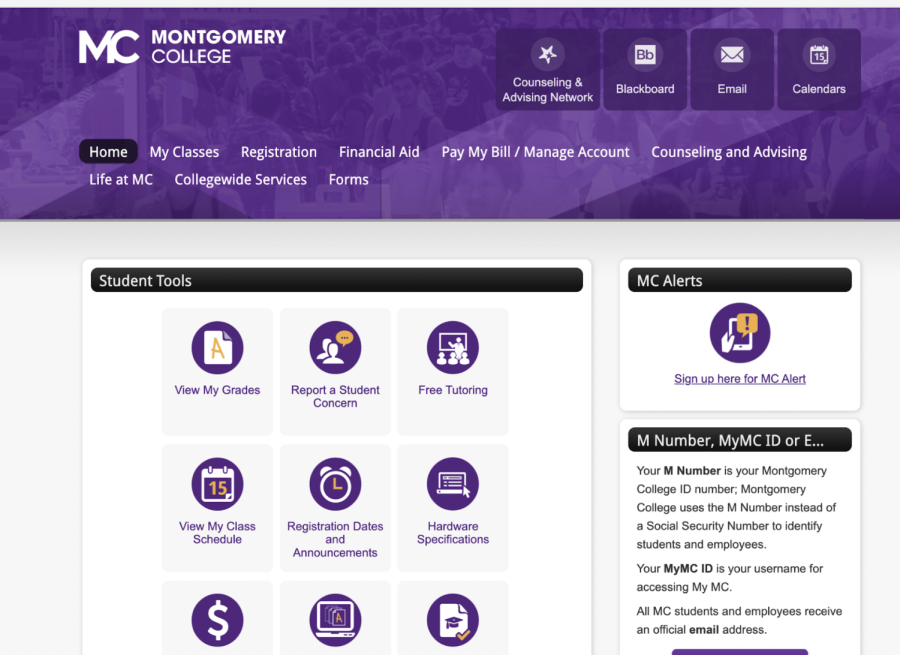True or false? Dual Enrollment misconceptions
A student logs in to their MyMCPS account, which is the portal through which they access all of their Dual Enrollment courses at Montgomery College.
May 15, 2023
Dual Enrollment, Dual Education, Dual Excitement. From Organic Chemistry to Philosophy in Literature, or Modern Military History to Advanced Object-Oriented C++ Programming, the 518 courses available at Montgomery College for Dual Enrollment credit cover an incredible range of subjects and topics. Unfortunately, the unparalleled opportunity to take college courses with experienced professors is one that is still often overlooked within the WCHS community.
If any WCHS student was to be stopped in the halls and asked why they do not participate in Dual Enrollment, the reasons reference misconceptions abound. The ideas that it is too expensive, that they are not qualified to do it, or that it is too much work are all incorrect and can be easily addressed.
Misconception #1: Dual Enrollment courses are too expensive.
WCHS students will be happy to know that beginning in the 2023-2024 school year, all eligible students will be able to take approved Montgomery College courses at no cost. Moreover, in early January 2023, a Maryland law was passed to erase this economic barrier for high-achieving students, stipulating that high school students would no longer be charged for tuition for such courses.
Although this change does not cover additional costs, such as textbooks or course-specific fees, it is important to note that MCPS Dual Enrollment grants exist for this purpose, and that these are also easily accessible to students. Thus, the previously considerable barrier of high costs for taking these college courses has been eradicated, and students of all income levels will have a greater freedom of academic choices.
Misconception #2: Dual Enrollment is only for “geniuses”.
Another common false idea students tend to have is that Dual Enrollment classes are extremely selective to get into, and that they have no chance. Although it is true that there are minimum academic requirements, many students, especially underclassmen, have already met those standards.
In terms of grade point average, prospective juniors must have a 2.75 GPA and seniors a 2.5 GPA. In terms of test scores, students must have received at least a 480 on the SAT or a 21 on the ACT for Critical Reading/English, and at least a 530 on the SAT or a 21 on the ACT for mathematics. Despite the fact that these are not inconsiderable requirements, they are much more attainable than what many WCHS students had been thinking.
Misconception #3: Taking Dual Enrollment courses will hurt my high school GPA.
Especially in an academic culture as competitive as the one at WCHS, maintaining one’s transcript and grades is a primary concern for the vast majority of students. Thus, they can be wary of taking a college course and receiving a lower grade than they are used to, which will bring down their GPA and hurt their college applications.
This is a patently false concern. Moreover, the Dual Enrollment Credit Refusal Form ensures that students have the option of taking approved courses without receiving high school credit for them, meaning that the course will go on their Montgomery College transcript, which they can separately request, without going on their high school transcript that colleges automatically receive. Furthermore, counselors strongly advise that for at least the first semester of taking Dual Enrollment courses, students take the safer route and refuse high school credit, regardless of what they choose to do for future semesters.
Therefore, because there are institutional and personal protections against students sabotaging their academic transcripts, students have the opportunity to take these courses without having to be overly concerned about the long-term consequences of having struggled in their first college class.
Misconception #4: There is no point in taking Dual Enrollment courses.
One aspect of the answer to this question is that Dual Enrollment is a singular way of demonstrating dedication to a particular academic pathway that a high school schedule cannot. In other words, because of the combination of the limited number of periods in the school day and the many requirements for graduation, there are often courses that students wish they could have taken but could not.
After-school Dual Enrollment classes could be the perfect solution for that. For example, students who want to pursue law but have exhausted the relevant courses at WCHS could take “Introduction to Law Enforcement”, “Criminal Law”, “Constitutional Law”, “Seminar: Criminal Justice” or any other class they think would help advance their passion in this area.
The second aspect of the answer is that for students who do not yet have a clear idea of what they want to do, taking a variety of Dual Enrollment courses could help point them in the right direction. These college courses offer a glimpse into what majoring in that area could look like, which gives students valuable insight into whether or not it is something they would like to pursue.
In all, the misconceptions that currently block many WCHS students from taking Dual Enrollment classes at Montgomery College are those that can be easily remedied by a visit to a school counselor, the Dual Enrollment information page on the WCHS Counseling website, or the MCPS Dual Enrollment FAQ site. Contrary to popular belief, Dual Enrollment classes are actually affordable, attainable, safe and meaningful.



